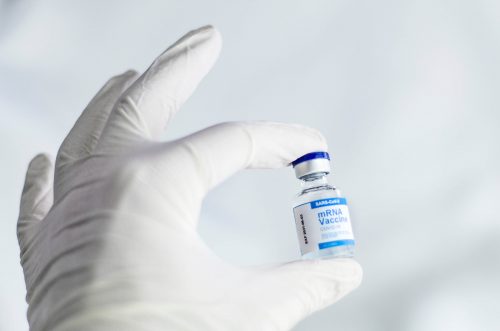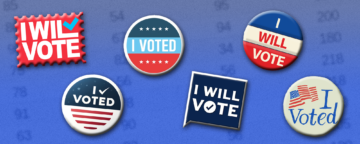About 15% are not sure and potentially persuadable
More than 259 million doses of Covid-19 vaccine have been given in the United States from December 14, 2020, through May 10, 2021. As of May 5, 2021, well over half a million deaths – 576,238 people – have been reported from Covid-19 in the United States.
Yet public health officials have expressed concern that many U.S. communities may not be on track to reach the level of immunity required to halt the replication and hence the mutation of SARS-CoV-2. The rate at which Americans are being vaccinated is slowing. Faced with a lack of demand, some vaccine sites have closed. In some places, vaccines are going unused.
A national probability Annenberg Science Knowledge (ASK) survey by the Annenberg Public Policy Center conducted March 30-April 19, 2021, among 1,941 U.S. adults found that although much of the public rejects false information about the virus, a substantial number of people are uncertain whether to embrace or reject consequential forms of misinformation about Covid-19 and vaccination against it. The percentages presented here combine those who consider a claim “probably” or “definitely” true as well as the percentages who consider a claim “probably” or “definitely” false. The margin of error is +/- 2.9 percentage points. (Additional findings on the prevalence of conspiracy beliefs may be found here.)
High levels of public confidence in the Covid-19 vaccines
“The fact that three out of four adults accept as true that the authorized vaccines are effective and safer than getting Covid-19 is remarkable,” said Kathleen Hall Jamieson, director of the Annenberg Public Policy Center (APPC) of the University of Pennsylvania. “Although the existence of 10-12% disbelievers is worrisome, in theory the 14-15% who are not sure are open to persuasion. Ensuring that those who believe in the safety and effectiveness of the vaccines get the shots – and persuading those who are not sure that they, their loved ones, and their community will benefit from higher rates of vaccination – are the unfinished tasks of the public health community and those already vaccinated.”
The survey found that:
- Almost 3 in 4 (74%) believe that Covid-19 vaccines are effective in preventing the illness. Another 14% are not sure whether that is true, and 12% regard that as false.
- Three in four (75%) know it’s safer to get the Covid-19 vaccine than to get Covid-19, while 10% regard that statement as false. Although the risks of getting infected with Covid-19 far outweigh the very small risks associated with getting one of the authorized vaccines, 15% are not sure whether it is safer to get the vaccine than to get Covid-19.
Survey respondents who were correct, incorrect, or not sure that…

Uncertainty associated with reluctance to vaccinate
Past research has shown that being misinformed about Covid-19 or Covid-19 vaccination (including holding conspiracy beliefs) is associated with a reduced willingness to get an authorized Covid-19 vaccine. Misinformation is difficult to correct but the unsure are more susceptible to persuasion.
Of the 1,941 U.S. adults who were surveyed, 705 reported either not having been vaccinated or not having been scheduled for vaccination yet. Two-thirds of those (67%) said they would get the vaccine and a third (33%) said they were “not going to get vaccinated at all.” The following analysis of beliefs associated with vaccination intention was based on the 705-person subsample.
Among the 705 non-vaccinated respondents, on the question of vaccine safety:
- 55% said it was safer to get the vaccine than to get Covid-19…
- … and 88% of this group intended to get the vaccine when it is available.
- 17% said it was not safer to get the vaccine than to get Covid-19…
- … and 29% of this group intended to get the vaccine.
- 28% were not sure whether it was safer to get the vaccine than to get Covid-19…
- … and 50% of this group intended to get the vaccine.
Among the 705 non-vaccinated respondents, on vaccine effectiveness*:
- 60% thought the vaccine was effective…
- …and 85% of this group would get the vaccine when it is offered.
- 20% thought the vaccine was not effective…
- … and 33% of this group would get the vaccine when offered.
- 21% were not sure if the vaccine was effective…
- … and 49% of this group would get the vaccine when offered.
*The total exceeds 100% due to rounding.
Uncertainty about the vaccine’s effectiveness was associated with the same groups of respondents across different beliefs that were surveyed, said Dan Romer, APPC’s research director. In general, individuals who are younger, female, less educated, have lower income, and identify as evangelical, Black or Hispanic, and not as members of the Democratic party were more likely to say they were unsure across the various beliefs.
Despite their uncertainty, because this group is willing to be vaccinated in larger numbers than those who are disbelievers, presenting them with the right information could be persuasive.
“It appears that many of those who have not yet received the vaccine are not sure whether it’s effective,” Romer said. “Helping them to feel more certain could be a strategy to move them closer to getting the vaccine.”
Knowledge about Covid-19 and Covid-19 vaccines
In addition, findings from the entire survey sample of 1,941 people include:
Transmission: 80% reject as false the claim that getting a flu shot increases your risk of contracting Covid-19. It doesn’t. 16% say they aren’t sure.
Transmission: The novel coronavirus, SARS-CoV-2, is a respiratory pathogen. Unlike Zika, Dengue, West Nile virus, and malaria, it is not transmitted by mosquitoes. The survey found that 78% got that right, but 17% aren’t sure whether or not that is true.
Preventives/Treatment: 73% correctly regard as false the statement that only people whose Vitamin D levels are low get Covid-19; 21% were not sure.
Vaccine safety: Though 69% correctly say that it is false that taking a Covid-19 vaccine can give you Covid-19, 15% of people were not sure and 16% thought it was true.
Vaccine ingredients: Despite the fact that the Moderna and Pfizer vaccines do not contain fetal tissue, 40% were not sure whether they do or not. The mRNA vaccines are not manufactured using fetal cell lines, although a cell line was used to test both mRNA vaccines to ensure that they worked.

Vaccine effects: The mRNA Pfizer and Moderna vaccines and the viral vector Johnson and Johnson vaccine deliver genetic material to the recipient’s cells to tell them to build protection against the SARS-CoV-2 virus. As the Centers for Disease Control and Prevention (CDC) notes, “the material never enters the nucleus of the cell, which is where our DNA is kept. This means the genetic material in the vaccines cannot affect or interact with our DNA in any way.” Although the Covid-19 vaccines cannot change the recipient’s DNA, 22% weren’t sure whether they do or not.
Vaccine effects: Although the CDC states that “there is no evidence that fertility problems are a side effect of any vaccine, including Covid-19 vaccines,” when asked whether it is true or false to say that Covid-19 vaccines do not cause infertility, 35% say they are not sure. Less than half of those surveyed (48%) said that Covid-19 vaccines do not cause infertility.
Vaccine effects: According to the medical examiner’s office in Fulton County, Ga., baseball legend and civil rights activist Henry “Hank” Aaron died from natural causes. There’s no evidence that his death was a result of being vaccinated against Covid-19 in early January, as multiple posts and articles shared on social media have suggested. Yet 68% indicated that they were not sure whether that was the case. Just over a quarter of those surveyed (27%) correctly said he died of natural causes.
Misinformation about the MMR vaccine
Although the measles, mumps and rubella (MMR) vaccine has reduced the incidence of measles dramatically in the United States and there is no credible evidence that the vaccine causes autism, lurking among these misinformed beliefs is that discredited claim, which was based in a badly flawed, retracted 1998 study in The Lancet.
When asked to assess the truth or falsity of the claim that vaccines given to children for diseases like measles, mumps, and rubella do not cause autism, 24% say they are not sure. When asked a related question, 19% reported that they were not sure whether “increased vaccinations are why so many kids have autism these days.” An earlier study conducted by scholars in the Annenberg Public Policy Center’s Science of Science Communication division during the 2015-16 U.S. Zika virus outbreak found that that unwarranted belief was associated with a reduced likelihood of being willing to take a Zika vaccine were one to be developed.
For the survey appendix containing the methodology and additional data, click here.

